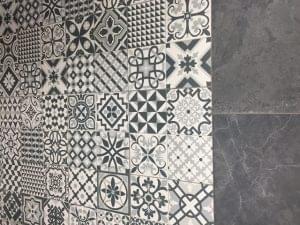Types of Tiles
Tiles are manufactured from a variety of materials such as clay, metal,
stone, terrazzo and quartz, each with its own characteristics.
Two of the most commonly used are Ceramic and Porcelain but in this article
we are going to give a comprehensive overview of most of the different
types available at McDaids Bathroom Plumbing Tiles.
Ceramic Tiles
Ceramic tiles are manufactured from clay that is quarried, prepared and formed
into a mould using methods that include dry press, extruded and slush mould.
Dry Press involves a mixture of dry material being pressed into a mould
under extreme pressure. Extruded Ceramic is formed when a mixture of
slightly wet material is extruded into a mould.
Slush mould is a forming method in which a mixture of very wet material
is poured into a mould and baked in a kiln at extremely high temperatures.
Traditional Ceramic Tiles tend to be ‘Red Bodied’ and is classed as Non-Porcelain
even though Porcelain and Ceramic are essentially the same, with one slight difference.
Porcelain Tiles
Porcelain Ceramic Tiles are made from clay and minerals also, but contain
50% of white dust or sand called Feldspar which is a type of crystal found in rock.
It’s this Feldspar that melts into a glass like material during the kiln drying process,
bonding all of the moulded ingredients together.
Any minor modifications to the ingredients or to the drying process can create
variety in the appearance and characteristics of the tiles.
Not only is porcelain tile more dense than traditional ceramic tile, but due
to its through-body composition, it is considered more durable and better
suited for heavy usage than ceramic.
Chip a ceramic tile and you will find a different colour underneath the top glaze.
Chip a porcelain tile and you will find that the colour keeps on going so the chip is nearly invisible.
Natural Stone Tiles
Natural Stone Tile is produced from natural minerals that are quarried,
slabbed, finished and cut to size. Common types include Granite, Marble,
Travertine and Slate.
There are thousands of different varieties depending on where and when the stone was quarried.
Granite
Granite is an excellent choice for kitchens and high-traffic areas.
Marble
More porous than granite and not recommended for kitchen flooring
unless sealed on a regular basis.
Travertine
Type of Limestone, can be easily scratched and stained. Special car and
surface sealing is required for maintenance.
Slate
Dense and very durable, slate is available in darker earthy tones.
It is naturally textured and is an excellent choice for kitchen or high traffic area flooring


